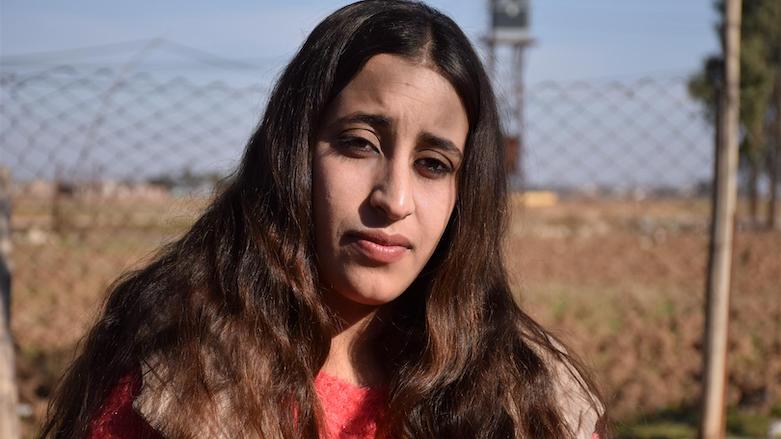Some Yezidi survivors still fear returning home to Sinjar

ERBIL (Kurdistan 24) – The Yezidi House in Syria’s Cizere canton announced on Monday it had received a Yezidi (Ezidi) survivor named Assimah Jassem Khedr.
Khedr, 20, told Hawar News Agency that she was liberated from the so-called Islamic State after seven years of imprisonment and enslavement in both Iraq and Syria. She also said she was afraid to return to her hometown Sinjar (Shingal).
According to Khedr, she was held under captivity by the extremist group in Syria for two years where she was “sold” to a member of the terrorist group in Baghouz who was later killed in battle when the region was liberated by the Syrian Democratic Forces (SDF) in March 2019. Khedr would end up conceiving the Islamic State fighter’s child.
Khedr told local media that after the battle, she was moved to the notorious al-Hol camp with her child and the rest of the women with alleged ties to the Islamic State, along with their children. The 20-year-old said she stayed at the camp for two years.
According to the rescued girl, some women whose allegiance remained with the terror group warned her about revealing her Yezidi identity to Kurdish security forces and told her that if she returned to Shingal, she would be killed.
In a statement, the Yezidi House said other survivors have told similar stories of these women persuading them to remain with the terrorist group and even trying to “scare” them to prevent Yezidis from returning home.
Award-winning Dutch-Kurdish filmmaker Reber Dosky told Kurdistan 24 that there are still Yezidi women and children being held by women with Islamic State ties in Al Hol who scare them into thinking “their own Yezidi community will kill them when they go back.”
Dosky is currently working on a documentary on Yezidi female survivors that is expected to be released in November 2021.
The filmmaker noted that many of the Yezidi children kidnapped by the Islamic State are alienated from their own culture, faith, and community. Some were allegedly also used as child soldiers, he said.
“It remains to be seen if these children will develop their identity in the future and if they will succeed in becoming part of the Yezidi community again,” Dosky said.
Pari Ibrahim, founder and executive director of the Free Yezidi Foundation, told Kurdistan 24 that some Yezidi women and children are afraid to identify themselves as Yezidis because of fears “of ISIS slave owners.”
“Some children can’t remember their own identities and therefore are unable to self-identify as Yezidis,” she added.
“We need to ensure women, girls, and children are given a chance to self-identify as Yezidis if they want, and children to be identified through DNA [tests],” Ibrahim continued. “We think it is important that the message goes out in Syria that Yezidis are accepting these women and girls back.”
Some women avoid returning home because they fear their children will not be accepted by the local community because they were conceived through rape by Islamic State fighters.
“We know this is very difficult for survivors and for the Yezidi community in general,” Ibrahim stated, encouraging efforts to be made “to consider the needs and wishes of these women and girls first, primarily, and mechanisms and support for those who are helping these women in difficult circumstances and for their recovery.”
“We need more international support for Yezidi women’s rights organizations to help support these women. This will improve the process of supporting Yezidis returning from the hell of ISIS captivity.”
Khedr was later smuggled out with the Islamic State-affiliated women from Al Hol to Al Busayrah in Syria’s Deir al-Zor province.
There, she lived in a difficult economic situation, according to statements she gave to local media. When Khedr eventually learned of other Yezidi survivors who returned to Shingal safely, she decided to go to the Asayish Women’s Centre in Deir al-Zor.
The Centre facilitated her transportation to the Hasakah province where she was handed over to the Yezidi House. The center plans to return her to her family in Shingal soon.
The emergence of the Islamic State and its violent assault on Iraq’s Yezidi-majority city of Shingal in August 2014 led to the displacement of hundreds of thousands of members of the community and the killing of scores more.
According to the Yezidi Rescue Office affiliated to the Kurdistan Region Presidency Office, it has saved over 3,537 Yezidis, out of the 6,417 people whom the Islamic State kidnapped (some 2,880 remain missing).
Editing by Karzan Sulaivany
